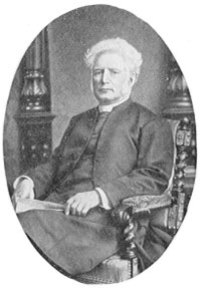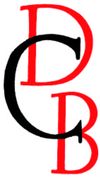
Source: Link
BOOMER, MICHAEL, Church of England clergyman and educator; b. 1 Jan 1810 in Hill Hall, near Lisburn (Northern Ireland), eldest son of George Boomer, a linen manufacturer, and Mary Knox; m. first 18 May 1842 Helen Blair, née Adams, at Galt, Canada West, and they had four children; m. secondly Isabella Jemima Davidson (d. 19 Aug. 1876), widow of Absalom Shade*; and m. thirdly in November 1878 Harriet Ann Roche, née Mills; d. 4 March 1888 in London, Ont.
Michael Boomer, who was of Huguenot descent, was educated at the Royal Belfast Academical Institution where he was a foundation scholar for five years. On 22 Oct. 1832 he entered Trinity College, Dublin, and graduated with a ba in the spring of 1838; he later received an llb and an lld in 1859. Boomer came to Canada in 1840 and was immediately ordained deacon by Bishop John Strachan* of Toronto. The following year Strachan priested him and he settled in Galt where for more than 30 years he acted as a missionary for the Society for the Propagation of the Gospel in Foreign Parts. During his tenure at Little Trinity Church the congregation expanded greatly and Boomer was instrumental in the construction of the substantial stone church and brick parsonage as well as the stone schoolhouse.
In 1872 Boomer left Galt for London when he was appointed dean of the diocese of Huron by the new bishop, Isaac Hellmuth*. Hellmuth had for ten years been attempting to construct a varied Church of England educational system in London to rival that of Toronto. Shortly after Boomer’s arrival, Hellmuth quarrelled with Isaac Brock*, the principal of the divinity school, Huron College, and the newly appointed dean soon replaced Brock as the principal and professor of divinity at Huron. Hellmuth was no doubt pleased with the change: Boomer, who had been on the council of Huron College since it was founded in 1863, wus already well acquainted with the college; having his dean as principal would allow the bishop to extend his influence; and, probably most important, the $2,000 salary and residence provided for Boomer by the college allowed Hellmuth to save the dean’s stipend. Unfortunately, the numerous demands of the dual role were probably too much for one man.
As principal, Boomer had immediate difficulties. The general depression of the economy caused both a constant drop in enrolment and an increasing concern over the strength of the various endowments which supported the college financially. Problems with staff, one of which resulted in a lawsuit that went against the college to its financial loss, and problems with students, who objected to strict regulations as well as administrative shortcomings, increased; only half fees were charged for the first term of 1879 after the college was unable to replace a professor who had died the previous year. As dean, Boomer was unable to keep the college’s graduates in the diocese; they were drawn away to surrounding dioceses where stipends were higher. Personal tragedy added to Boomer’s worries. After the deaths of his son in China and of his second wife, Boomer asked for leave from his duties in September 1876; he was not to return to them for more than two years.
During this time, however, he presided at a meeting of alumni and students of Huron on 20 Feb. 1877 which pressed for the incorporation of a new university. On 7 March 1878 a charter was granted to the Western University of London, Ontario (now the University of Western Ontario) and on 9 May Boomer was elected vice-chancellor and provost, Hellmuth being chosen chancellor. The charter provided for the affiliation of Huron, and the council of the college decided on 20 May 1881 to join the university as soon as it opened. Classes in arts and divinity began at the university in October of that year with Boomer serving as professor of divinity; the affiliation with the university did not alter the character of the teaching of this subject. An amendment to the university’s charter in 1882 provided that only members of the Church of England could sit on the senate, the purpose being to ensure grants from the Society for Promoting Christian Knowledge. Nevertheless, financial difficulties continued and were complicated by the departure of the university’s most powerful supporter, Hellmuth, on his resignation as bishop in 1883. That year the first graduates completed their degrees in arts, but enrolment remained small.
In the midst of these struggles Boomer suffered a paralytic stroke in 1884 which prevented him from carrying out his duties. On 24 September he was granted six months’ leave but his active involvement with university and college was finished. He resigned as principal of the college on 22 May 1885, one month after the college had decided to disaffiliate from the university; the resignation became effective 1 October. He did, however, remain dean of the diocese until his death. Boomer’s third wife was active in fund raising for the college from her arrival in Canada and continued her philanthropic labours into the next century.
Boomer’s 13-year principalship of Huron College, after a long and successful parish ministry, was not a happy period but he had struggled to carry the too heavy burden Hellmuth had given him and he had helped to establish what is now a major Canadian institution.
Church (Toronto), 21 May 1842. Dominion Churchman (Toronto), 15 March 1888. London Advertiser (London, Ont.), 5 March 1888. London Free Press (London), 6, 8 March 1888. Alumni Dublinensis: a register of the students, graduates, professors, and provosts of Trinity College, in the University of Dublin, ed. G. D. Burtchaell and T. U. Sadleir (Dublin, 1924), 81. Canadian biog. dict., I: 327–28. Chadwick, Ontarian families, I: 87. J. J. Talman, Huron College, 1863–1963 (London, 1963), 34–47. J. J. and R. D. Talman, “Western” – 1878–1953: being the history of the origins and development of the University of Western Ontario during its first seventy-five years (London, 1953).
© 1982–2024 University of Toronto/Université Laval
Image Gallery

Cite This Article
James John Talman, “BOOMER, MICHAEL,” in Dictionary of Canadian Biography, vol. 11, University of Toronto/Université Laval, 2003–, accessed April 25, 2024, http://www.biographi.ca/en/bio/boomer_michael_11E.html.
The citation above shows the format for footnotes and endnotes according to the Chicago manual of style (16th edition). Information to be used in other citation formats:
| Permalink: | http://www.biographi.ca/en/bio/boomer_michael_11E.html |
| Author of Article: | James John Talman |
| Title of Article: | BOOMER, MICHAEL |
| Publication Name: | Dictionary of Canadian Biography, vol. 11 |
| Publisher: | University of Toronto/Université Laval |
| Year of publication: | 1982 |
| Year of revision: | 1982 |
| Access Date: | April 25, 2024 |









